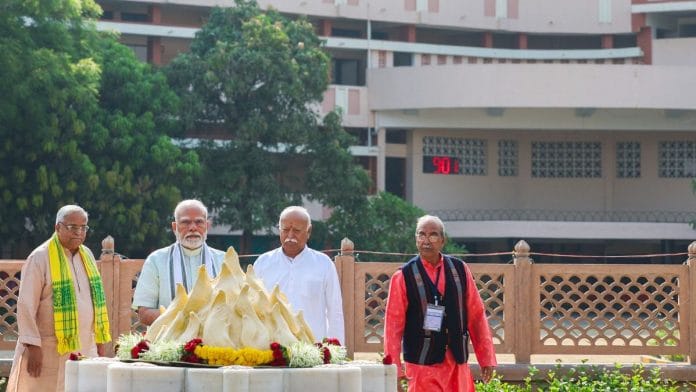Thank you dear subscribers, we are overwhelmed with your response.
Your Turn is a unique section from ThePrint featuring points of view from its subscribers. If you are a subscriber, have a point of view, please send it to us. If not, do subscribe here: https://theprint.in/
The Rashtriya Swayamsevak Sangh (RSS) was founded in 1925 by Dr. Keshav Baliram Hedgewar with the vision of fostering a strong and united Bharat. Over the last hundred years, the RSS has grown into the world’s largest voluntary organization, with a profound impact on Indian society, culture, and national identity. From nation-building to humanitarian efforts, social reforms, and cultural preservation, the RSS has made significant contributions across various domains.
Early Years and Foundation (1925-1947)
The RSS began as a small cadre-based organization in Nagpur, with a focus on character building, discipline, and unity. It played a role in instilling nationalist values and worked towards fostering a sense of cultural pride. By the time of India’s independence in 1947, the RSS had established a strong grassroots network, which laid the foundation for its future activities.
Strengthening National Unity and Security (1947-1975)
Post-independence, the RSS played a crucial role in aiding refugees during Partition. It provided relief camps and worked to rehabilitate displaced individuals. The organization also actively contributed during wars, mobilizing volunteers to assist the armed forces and provide logistical support.
During the Emergency (1975-1977), RSS members played a pivotal role in resisting authoritarian rule and upholding democratic values. Many members were imprisoned for their participation in protests against the suspension of civil liberties.
Social Welfare and Education (1977-2000)
The RSS expanded its outreach through its affiliated organizations, known as the Sangh Parivar. Institutions like Vidya Bharati and Bharatiya Mazdoor Sangh focused on education and labor rights, respectively. Ekal Vidyalayas were established to provide education to tribal and rural children.
Seva Bharati, another RSS-affiliated organization, undertook extensive work in rural development, healthcare, and disaster relief, helping communities across India during natural calamities such as earthquakes, floods, and cyclones.
Cultural Renaissance and Hindutva Ideology (2000-2025)
The RSS has played a key role in preserving and promoting Indian culture and traditions. Through organizations like Vishwa Hindu Parishad (VHP) and Sanskrit Bharati, it has revived interest in Sanskrit, yoga, and traditional Indian knowledge systems.
The organization has also been at the forefront of advocating for the Ram Janmabhoomi movement, culminating in the construction of the Ram Temple in Ayodhya, a landmark moment in India’s cultural and religious history.
The Rashtriya Swayamsevak Sangh (RSS), as the ideological backbone of the Bharatiya Janata Party (BJP) and a strong proponent of national unity, played a significant role in the abrogation of Article 370. This historic move, carried out on August 5, 2019, by the Government of India, revoked the special status of Jammu & Kashmir, integrating it fully into the Indian Union.
From its inception, the RSS has advocated for a unified and undivided India, opposing any provision that grants special status to a particular region. Dr. Syama Prasad Mookerjee, founder of the Bharatiya Jana Sangh (the predecessor of BJP), led a strong movement against Article 370, famously coining the slogan: “Ek desh mein do vidhan, do pradhan, do nishan nahi chalenge” (One nation cannot have two constitutions, two heads, and two flags). His sacrifice in 1953 strengthened the ideological resolve of the RSS and its affiliated organizations to continue the struggle for a fully integrated India.
RSS and its affiliate organizations, such as the Vishwa Hindu Parishad (VHP) and Akhil Bharatiya Vidyarthi Parishad (ABVP), played a crucial role in shaping public opinion against Article 370.
Modern Contributions and Global Outreach
In recent years, the RSS has extended its influence beyond India, with branches in various countries working to connect the Indian diaspora to their cultural roots. It has also embraced technological advancements to spread its message and coordinate social initiatives effectively.
During the COVID-19 pandemic, RSS-affiliated volunteers played a significant role in relief efforts, providing food, medical aid, and logistical support across the country.
Future Expectations from RSS
RSS’s role in shaping India’s social, cultural, and political landscape will be put to test as the country marches towards development/ Moving forward, several key expectations arise from the organization as it adapts to contemporary challenges while staying true to its foundational ideals, for example Strengthening National Unity and Social Harmony, Youth Engagement and Leadership Development, Cultural and Educational Renaissance, Contribution to National Security and Self-Reliance, Expanding Global Outreach, Rural and Economic Development, Environmental and Sustainable Development Initiatives, etc.
As the RSS steps into its second century, expectations will be high for its continued role in shaping a strong, self-reliant, and harmonious India. By staying committed to its core values while evolving with changing times, the RSS and its Swayamsevaks can further contribute to national development and global goodwill.
These pieces are being published as they have been received – they have not been edited/fact-checked by ThePrint.


